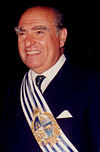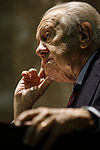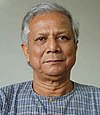Simón Bolívar Prize
With the Simón Bolívar Prize ( English : International Simón Bolívar Prize ), UNESCO honored outstanding services that, in accordance with the goals of the South American independence fighter Simón Bolívar for "freedom, independence and dignity of peoples and for strengthening a new international economic, contribute to the social and cultural order ”, whereby the merits could be acquired in an intellectual, artistic or social field or through the mobilization of public opinion. The award, which was launched in 1978 at the suggestion of the then Venezuelan President Carlos Andrés Pérez , was first presented in 1983 and most recently in 2004. A reactivation is under discussion.
According to the underlying guidelines, the award of the prize should take place every two years around July 24th, Simón Bolívar's birthday. In fact, nine awards took place between 1983 and 2004, in 1983, 1985, 1988, 1990, 1992, 1996, 1998, 2000 and 2004. The prize money was donated by the Venezuelan government and set by the latter in agreement with the Director General of UNESCO. Most recently, the prize was endowed with 25,000 US dollars. The laureates were chosen by a unanimous vote of an international jury, which included five representatives from different regions of the world, a person appointed by the Venezuelan government and a representative of the Director General of UNESCO.
Award winners
| year | portrait | Award winner and reason for the award | ||
|---|---|---|---|---|
| 2004 | Nadia Al-Jurdi Nouaihed | Lebanese writer | (* 1929) | |
| The Lebanese writer Nadia Al-Jurdi Nouaihed spent ten years of her life in Venezuela. She is considered an expert on Simón Bolívar, whose work she made known in the Arab world with her book “Muharer Simon Bolivar” (1994). | ||||
| Casa de las Americas | Cuban cultural institute | (founded 1959) | ||

|
The Cuban cultural institute Casa de las Américas is dedicated to promoting socio-cultural exchange between artists from Latin America, the Caribbean and the rest of the world. The magazine Casa de las Américas, revista de letras e ideas published by the institute is considered to be one of the most important cultural magazines in the Spanish language. | |||
| 2000 | Samuel Ruiz García | Mexican bishop | (1924-2011) | |

|
Samuel Ruiz García was a Mexican clergyman and served as Bishop of San Cristóbal de las Casas from 1959 to 1999. He was seen as a defender of the concerns of the indigenous people of Mexico. He was awarded the Simón Bolívar Prize for his "considerable personal commitment and his role as a mediator, with which he contributed to peace and the respect for the dignity of minorities". | |||
| Julio María Sanguinetti | former President of Uruguay | (* 1936) | ||

|
Julio María Sanguinetti is a Uruguayan politician, lawyer and journalist. From March 1, 1985 to March 1, 1990 and from March 1, 1995 to March 1, 2000 he held the office of President of Uruguay. He was critical of the military coup of 1973 and conducted negotiations with the military with the aim of finding a peaceful transition to democracy. He was awarded the Simón Bolívar Prize for his “considerable personal commitment and for his initiatives to promote development, peace and culture”. | |||
| 1998 | Mario Soares | former Prime Minister of Portugal | (* 1924) | |

|
Mário Soares is a Portuguese politician and was Prime Minister from 1976 to 1977, 1978 and 1983 to 1985 and President of his country from 1986 to 1996. As a lawyer, he had defended political prisoners in the Estado Novo and spent several years in exile. With the award of the Simón Bolívar Prize, the jury recognized Soares' “international efforts for peace, freedom, human rights and the fight against terrorism”. | |||
| Milad Hanna | Egyptian writer | (* 1924) | ||
| Milad Hanna is an Egyptian writer, professor and former MP in the Egyptian National Assembly. He is considered an important Coptic thinker and was chairman of the Egyptian Coptic Society. Hanna was particularly committed to intercultural dialogue and was committed to providing low-income people with adequate living space. The publication of his book "I want shelter" (1978) led to his three years in prison. He was awarded the Simón Bolívar Prize for his "advocacy for Egypt's national unity and the strengthening of civic responsibility". | ||||
| 1996 | Muhammad Yunus | Bangladeshi economist | (* 1940) | |

|
Muhammad Yunus is the founder and former managing director of the Grameen Bank, the microcredit provider, and one of the founders of the microfinance concept. At the presentation of the Simón Bolívar Prize, UNESCO Director General Federico Mayor paid tribute to Yunus' commitment to fighting poverty and giving the poor their human dignity. | |||
| 1992 | Aung San Suu Kyi | Burmese opposition politician | (* 1945) | |

|
Aung San Suu Kyi is a Burmese opposition politician who has been campaigning for the non-violent democratization of her home country since the late 1980s. In 1991 she was awarded the Nobel Peace Prize for this. Aung San Suu Kyi has been under house arrest for a total of 15 years. Under her party leadership, the National League for Democracy won the 1990 elections, but the result was not recognized by the military government. The jury of the Simón Bolívar Prize recognized her non-violent advocacy for human rights. | |||
| Julius Nyerere | former President of Tanzania | (1922–1999) | ||

|
Julius Nyerere was a Tanzanian politician and from the independence of his home country in 1961 until his resignation in 1985 he was President of Tanzania. The jury of the Simón Bolívar Prize recognized him as a "great humanist whose values have influenced several generations". Nyerere waged an uncomfortable fight against poverty, disease and ignorance and advocated economic, social and cultural cooperation between North and South. | |||
| 1990 | Vaclav Havel | President of Czechoslovakia | (1936-2011) | |

|
Václav Havel was a Czech writer and politician who was one of the leading critics of the regime of Czechoslovakia during the rule of the Communist Party and was one of the initiators of Charter 77. He is considered to be the pioneer of German-Czech reconciliation. After the Velvet Revolution, in which he played a major role, he was President of Czechoslovakia from 1989 to 1992. When the Simón Bolívar Prize was awarded, the laudation said: “Havel is neither an anti-communist nor a friend of capitalism, he fights for freedom in the simplest and most obvious sense of the word. He rejects any abuse of power. " | |||
| 1988 | Vicaría de la Solidaridad | Chilean human rights organization | (1976-1992) | |
| The human rights organization Vicaría de la Solidaridad was founded in 1976 by Raúl Silva Henríquez, Archbishop of Santiago de Chile. Her main concern was to support the victims of the military dictatorship under Augusto Pinochet. She was awarded the Simón Bolívar Prize for her “tireless fight to defend freedom and respect for human rights”. | ||||
| 1985 | Contadora Group | Initiative to resolve the conflict in El Salvador, Nicaragua and Guatemala | (founded 1983) | |
| The Contadora Group was an initiative launched in 1983 by the Foreign Ministers of Colombia, Mexico, Venezuela and Panama to resolve the military conflict in El Salvador, Nicaragua and Guatemala. Their work led to the Esquipulas Peace Accords in 1987. The Simón Bolívar Prize jury recognized the group's commitment to end the suffering of the people of Central America, to ensure that each of the peoples could exercise their right to dignity and independence, and to find a solution to a conflict, which with its continued existence would have seriously endangered the prospect of peace in the world. | ||||
| 1983 | Juan Carlos I. | King of Spain | (* 1938) | |

|
Juan Carlos I was King of Spain from 1975 to 2014. He is the eldest son of Juan de Borbón y Battenberg and thus the grandson of King Alfonso XIII. from Spain. Its role is considered essential for the democratization of Spain that took place after the end of the Francoist dictatorship. For this, and in recognition of the fact that he is the surest guarantor of democracy in his home country, he was awarded the Simón Bolívar Prize. | |||
| Nelson Mandela | South African opponent of apartheid | (1918-2013) | ||

|
Nelson Mandela was a leading anti-apartheid fighter in South Africa. Along with Martin Luther King, he is considered to be the most important representative in the fight against the global oppression of blacks and a pioneer of the conciliatory transition from apartheid to an equality-oriented, democratic South Africa. The jury of the Simón Bolívar Prize recognized him as a symbol of the long struggle of his people for dignity and freedom. | |||
Individual evidence
- ↑ a b UNESCO: International Simón Bolívar Prize - Rules for the Prize, ( Memento of the original from March 4, 2016 in the Internet Archive ) Info: The archive link was inserted automatically and has not yet been checked. Please check the original and archive link according to the instructions and then remove this notice. Retrieved February 14, 2011.
- ↑ UNESCO: International Simón Bolívar Prize - Laureates, accessed February 14, 2011.
- ↑ a b German UNESCO Commission e. V .: Awards for Human Rights, Peace, Ethics and Social Sciences, accessed February 14, 2011.
- ↑ UNESCO: International Simón Bolívar Prize - Call for Nominations, ( Memento of the original from March 4, 2016 in the Internet Archive ) Info: The archive link was inserted automatically and has not yet been checked. Please check the original and archive link according to the instructions and then remove this notice. Retrieved February 14, 2011.
- ↑ a b UNESCO press release No. 2004-51, accessed on February 14, 2012.
- ↑ UNESCO: 2000 - Samuel Ruiz García, ( Memento of the original from March 3, 2016 in the Internet Archive ) Info: The archive link was inserted automatically and has not yet been checked. Please check the original and archive link according to the instructions and then remove this notice. Retrieved February 14, 2012.
- ↑ UNESCO: 2000 - Julio Sanguinetti, accessed February 14, 2012.
- ↑ UNESCO: 1998 - Mario Soares, ( Memento of the original from March 4, 2016 in the Internet Archive ) Info: The archive link was inserted automatically and has not yet been checked. Please check the original and archive link according to the instructions and then remove this notice. Retrieved February 14, 2012.
- ↑ UNESCO: 1998 - Milad Hanna, ( Memento of the original from March 29, 2017 in the Internet Archive ) Info: The archive link was inserted automatically and has not yet been checked. Please check the original and archive link according to the instructions and then remove this notice. Retrieved February 14, 2012.
- ↑ UNESCO: UNESCO press release No. 1996-183e, accessed on February 14, 2012.
- ↑ a b UNESCO: Official Ceremony for the Award of the 1992 International Simón Bolívar Prize (PDF file; 1.2 MB), accessed on February 15, 2012.
- ↑ UNESCO: 1990 - Vaclav Havel, ( Memento of the original from March 4, 2016 in the Internet Archive ) Info: The archive link was inserted automatically and has not yet been checked. Please check the original and archive link according to the instructions and then remove this notice. Retrieved February 15, 2012.
- ↑ UNESCO: 1988 - Vicaría de Solidaridad, ( Memento of the original from July 20, 2016 in the Internet Archive ) Info: The archive link has been inserted automatically and has not yet been checked. Please check the original and archive link according to the instructions and then remove this notice. Retrieved February 15, 2012.
- ↑ a b c UNESCO: Address by Amadou Mahtar-M'Bow on the occasion of the award of the Simón Bolívar Prize, June 20, 1985 (PDF file; 167 kB), accessed on February 15, 2012.